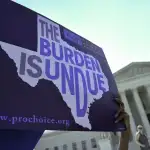We’re the only newsroom dedicated to writing about gender, politics and policy. Subscribe to our newsletter today.
Texas Gov. Greg Abbott on Tuesday misstated the basics of how pregnancy works and the harsh impact of Texas’ six-week abortion ban, which went into effect last week and is already inspiring copycat legislation across the country.
The law, Senate Bill 8, essentially eliminates abortion in the state and does not make exceptions for people who are pregnant as a result of rape or incest. At a news conference for the signing of a new law imposing voting restrictions, a reporter asked: “Why force a rape or incest victim to carry a pregnancy to term?”
Abbott replied: “It doesn’t require that at all, because obviously it provides at least six weeks for a person to be able to get an abortion.”
He also added that the state would “work tirelessly” to “eliminate all rapists” through arrests and prosecutions.
The governor’s answer demonstrates a common misconception about the law: Six weeks of pregnancy does not mean six weeks to get an abortion. SB 8 has been deemed the most restrictive active law in the country, largely because the window to get an abortion is limited to two weeks at most.
Gestational age begins at the end of a previous period, and the first sign of pregnancy is often missing one’s period. A typical menstrual cycle lasts 28 days, or about four weeks. A person cannot get pregnant until after they have ovulated, which generally happens halfway through the cycle.
That means that if someone has a perfectly regular menstrual period, they may know they are pregnant by what we call four weeks of pregnancy. That leaves two weeks at most for people to get an abortion. But those with irregular periods — a common consequence of stress or fatigue — may not know until even later that they could be pregnant, or should take a test, cutting further into that six-week window. And while some tests can detect pregnancy before a missed period, it isn’t common. Almost half of all pregnancies are unplanned, meaning many people are not actively monitoring to see if they are pregnant.
“To call it a six-week ban — it’s really a two-week window at best,” Katherine Kraschel, a lecturer at Yale Law School and expert on reproductive health policy, told The 19th after Texas initially passed the law. “That would be if the pregnancy test was taken the day they missed their period, and assuming they have a four-week menstrual cycle.”
The data supports that. Nationally, almost two-thirds of abortions occur after six weeks, per statistics from the Centers of Disease Control and Prevention. In Texas, the figure appears even bigger: 85 to 90 percent of abortions performed are for people who are beyond six weeks pregnant, according to the state’s reproductive health clinics.
In Texas, access to abortion was already hard to come by. The six-week ban is part of a network of laws that has limited access to the procedure. Patients must visit the abortion provider twice and wait 24 hours between visits. Insurance is generally banned from covering the procedure, which can cost hundreds of dollars.
A 2013 restriction that was ultimately struck down had required that any doctor providing an abortion have admitting privileges at a hospital within 30 miles. That provision was in effect for almost three years and resulted in many state clinics closing their doors.
Now, Texas’ new law is exacerbating that issue. It is already driving state clinics to scale back their services dramatically so that they are in compliance with the law. Many are expected to shut down completely, eliminating any nearby option for people seeking an abortion — after six weeks, or even before.
Some Texans will be able to travel across state lines for abortions. Indeed, many are already doing so, with clinics in Oklahoma, New Mexico, Kansas and Colorado already reporting patient surges. The journey is an average of more than 200 miles, per the Guttmacher Institute, which tracks reproductive health policy.
But people who cannot make the trip — whether because of travel or lodging expenses, child care challenges, or the inability to get time off — will either be forced to carry their pregnancies to term or to attempt a self-induced abortion, which can be life-threatening.






